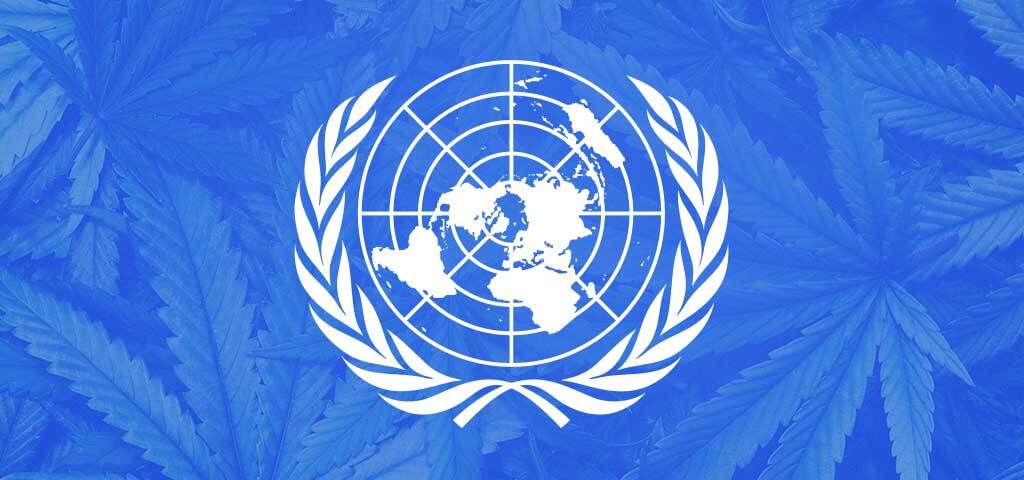
This Wednesday, December 2nd, the United Nations Commission on Narcotic Drugs (CND) began voting on six major cannabis recommendations set forth by the World Health Organization (WHO). The vote will continue through Friday, December 4th.
The 53 nations involved in the vote could, by majority rule, remove cannabis from Schedule IV — the strictest schedule of the 1961 Single Convention on Narcotic Drugs. The decision would not only recognize cannabis as medically legitimate, but also remove it from a category occupied by far more powerful drugs including heroin.
The UN May Vote to De-schedule Cannabis
Recommendation 5.1 is one of six recommendations that has been on the table for several years. However, the best chance it has to pass is this upcoming vote.
According to Marijuana Business Daily, the recommendation was first proposed by the WHO in January 2019.
The proposal came after the WHO recognized cannabis’ medicinal potential and its lack of harmful effects when compared to other drugs in Schedule IV.
However, member states postponed the vote repeatedly postponed so that each could consider the implications of removing cannabis from Schedule IV. As a result, it was rescheduled from March 2020 to December.
During the summer, member states met several times to discuss legal and economic benefits to approving the WHO recommendation.
Other Cannabis Recommendations
According to the CND, most of the recommendations deal with de-scheduling cannabis and its extracts from Schedule IV and instead rescheduling it to Schedule I. According to the Single Convention on Narcotic Drugs, Schedule I includes drugs that have mild ill-effects and substantial therapeutic value. Other substances in this category include the coca leaf, morphine, opium, and oxycodone.
The individual recommendations include:
- 5.1 directly seeks to delete cannabis and cannabis resin from Schedule IV of the 1961 convention.
- 5.2 seeks to add dronabinol, an anti-nausea medication, and its stereoisomers to Schedule I.
- 5.3 seeks to add the single cannabinoid, THC, to Schedule I.
- 5.4 seeks to delete extracts and tinctures of cannabis from Schedule I.
- 5.5 lobbies for the addition of a footnote on cannabidiol (CBD) preparations to Schedule I of the 1961 Convention to read: “Preparations containing predominantly cannabidiol and not more than 0.2 per cent of delta-9-THC are not under international control.”
- 5.6 seeks to add preparations containing dronabinol that are not readily available or in a yield which would constitute a risk to public health to Schedule III of the 1961 Convention.
Recommendation 5.5

It is unlikely any of the recommendations will pass except 5.1 due to international skepticism about the safety of cannabinoids. However, recommendation 5.5 has come under particular scrutiny.
Marijuana Moment reports that the U.S. remains firmly against recommendation 5.5, warning that the proposal introduces “legal ambiguities and contradictions that would undermine effective drug control.”
To be clear, the recommendation clarifies that any CBD containing .2% THC is no longer a controlled substance under international treaties.
The U.S. mainly opposes the recommendation due to the belief that THC not subject to international control will likely lead to THC extracts becoming more widely available. As such, American officials also believe the potential for cannabis abuse will increase.
However, the WHO’s recommendations do not directly promote the recreational use or the legalization of cannabis.
Recommendation 5.5 is notably the only WHO recommendation that falls outside the rescheduling process. The recommendation instead seeks to add a footnote regarding international control to Schedule I.
The Vote
For information on how the vote is likely to unfold, Emerald reached out to Robert Murtfeld, a business development director with connections to UN delegates.
Murtfeld cited China and Russia as the primary opposition to the passing of recommendation 5.1. He further speculated that the two countries may even push for another postponement.
Conversely, Murtfeld said, “the European countries and the United States are likely to vote in favor” of recommendation 5.1.
As to whether the other recommendations will pass, Murtfeld said that it is unlikely. “None of the other recommendations are likely to go through, just 5.1,” he explained.
Addressing the concern over an increase in THC usage if recommendation 5.5 were to pass, I asked Murtfeld if there was any legitimacy behind this belief.
“The consumption being voted on is only for medicinal use,” Murtfeld explained. “That’s all that’s being decided, so issues of recreational consumption are irrelevant.”
When I asked if 5.1 would affect some countries greater than others, Murtfeld didn’t think that would happen. “It’s a treaty, so all countries will be affected. They are simply amending the treaty from 1961 and trying to loosen up those measures,” he said.
The UN’s decisions should come by tomorrow, December 4th, assuming the vote isn’t delayed any further.
The odds seem to be in recommendation 5.1’s favor. But there are other countries likely to vote in opposition of it besides China and Russia. Nigeria has also opposed the recommendations fiercely, seemingly using talking points similar to U.S. drug policy of the 1980s, according to Marijuana Moment.
Despite cannabis’ rising acceptance in recent years, modest recommendations like 5.1 still face considerable opposition on the international stage.
UPDATE: The UN passed recommendation 5.1 by a majority of 27 votes on Wednesday, December 2nd.
By Thomas O’Connor



Leave a Reply